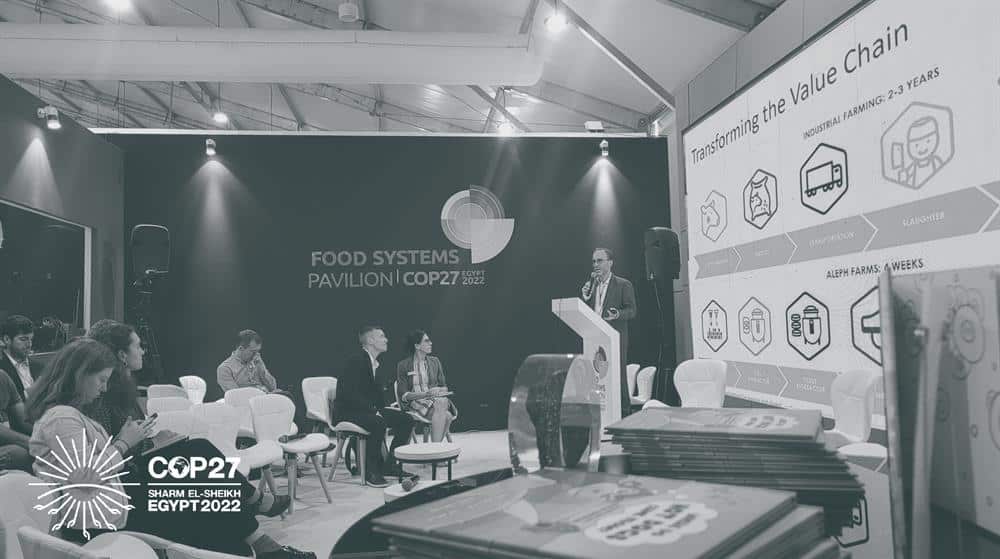We recently returned from COP27, where national, corporate and technology leaders convened to address the climate crisis and act on behalf of humanity and the planet. More than any previous United Nations Climate Change Conference of Parties, COP27 put the spotlight on food’s role in climate change. It was the first-ever COP to host food pavilions and had not one, not two, but three of them.
Aleph Farms was a partner in the Food Systems Pavilion, which showcased some of the groundbreaking innovations that are changing how people produce and consume food. This inaugural pavilion served as a testament to increased recognition of how important modernizing food systems is for addressing climate change. What’s more, it embodied a value that is essential for groundbreaking solutions to take effect: inclusivity.

Inclusivity as a top priority
The three food pavilions spanned the public, private and not-for-profit arenas of food, including farmers, producers, policymakers, scientists, Indigenous Peoples, NGOs and IGOs, and youth representatives. This diversity of expertise and backgrounds aligns with our belief in a Just Transition and our inclusive approach to the sustainability of food systems.
Our Co-Founder and CEO, Didier Toubia, and our VP Sustainability, Dr. Lee Recht, spent much of COP27 conveying this message, emphasizing the need to transform value chains in ways that are just and inclusive for farmers, ranchers, and other food producers.
“As discourse around a Just Transition builds steam, it’s clear that solutions exist and that they don’t create a zero-sum game with food producers,” said Toubia. “These solutions, including regenerative agriculture and cellular agriculture, can serve as the foundation of an inclusive transition to sustainable and resilient food systems.”
Longstanding partners convening on top issues
Given COP27’s focus on turning commitments into action, we also saw a heightened focus on some of the most fundamental and practical issues for which all transformative technologies need to account. One such topic in particular – safety – is a major element in creating and maintaining consumer trust.
As cultivated food continues to hit new milestones in regard to public trust, the Food and Agriculture Organization of the United Nations (FAO) and other entities focused on food safety are responding accordingly. This manifested at COP27, where FAO led dialogue on engaging the private sector on sustainable and inclusive agriculture transformation. When such entities communicate cultivated meat’s potential to provide adequate and safe nutrition, they become partners in solving humanity’s most significant food-related challenges.
Food brings people together. So does fixing food systems.
For all of human history, food has had a special way of bringing people together. Just over the past few years, ensuring food security has begun to have a similar effect. Governments around the world are increasingly aware of cultivated meat’s potential to provide adequate nutrition, empower local communities and spur economic growth for their populations. This knowledge has fostered regional cooperation, often in unexpected places.
At a meeting of representatives from across the Middle East, some nations that otherwise do not have any formal relations agreed to work in tandem to fight climate change. Israel’s environmental protection minister attended the meeting alongside leaders from Iraq and Lebanon (countries that do not have formal relations with Israel). All signatories present pledged to work together to reduce carbon emissions and incorporate mitigation and adaptation policies across numerous sectors.
At first glance, diplomatic tensions may appear to lower the prospect of cooperation on food security. In reality, because neighboring countries share specific climate conditions, they are bound to face similar climate-related challenges. This makes regional cooperation more likely, not less, and reveals cultivated meat’s capacity to serve as a cornerstone for more resilient production systems that enhance food security.
Eyes on off COP27
After playing a leading role on numerous panels and forums, with COP27 behind us, the bulk of the work lies ahead.
It is our hope that COP27 propels both the public and the private sector towards much success in fighting climate change. We look forward to playing a major role by building food systems that are more sustainable, equitable and resilient.
We’ll also be sure to see you in 2023 at COP28 in the United Arab Emirates. Next year’s host country is the home of the Agriculture Innovation Mission for Climate (AIM for Climate) initiative, which is a major advocate of solving agri-food’s impact on climate. AIM for Climate launched at COP26 and at this year’s conference doubled its investment commitment to more than $8 billion. Earlier this year, Aleph Farms was recognized as an Innovation Sprint Partner of AIM for Climate.
